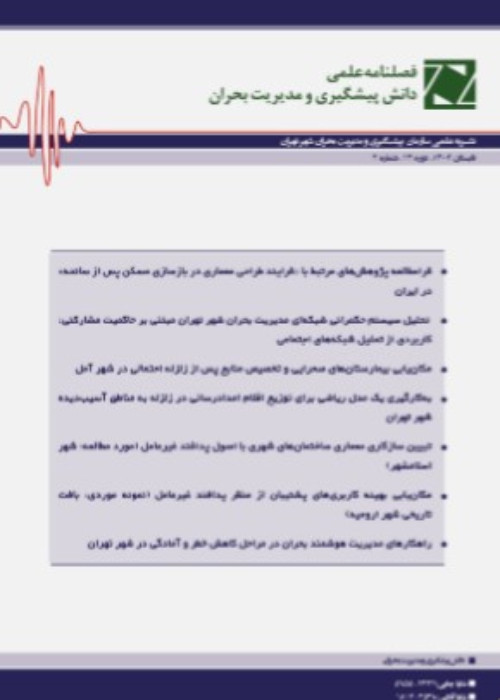Crisis management based on network approach
Author(s):
Abstract:
Background And Objective
Issues that threaten peace, life or wellbeing of humans in specific regions of the world cannot be solved by any single actor. It requires participating of wide networks of political, business, governmental, non-profit and humanitarian organizations.The problem is that the form of network by itself increases the uncertainty about coordination and also, collaboration of different actors in a wide network is difficult and time-consuming. So, the purpose of the present study is answering to the critical question that despite the uncertainty and difficulty of coordinating the networks, how can one use network approach as a tool to manage and respond to the crisis?
Method
A sample of 20 articles which include the keywords of Crisis management, Network, Uncertainty, Mobilizing Network or Incident Command System are selected from ISI articles published through the past twenty years. Then, by reviewing the literature of crisis management, networks and combining them, a combinational approach is proposed to respond and manage the crisis.Findings: Three types of network uncertainty are substantive uncertainty, strategic uncertainty and institutional uncertainty. There are some techniques to overcome these uncertainties such as learning, familiarity, strong prior working relationships and preplanning. Mobilizing network, incident command system and network governance can be used to increase network coordination.
Conclusion
Crises are defined by their relationship with uncertainty. New and non-regular crisis tasks would require an ad hoc network of responders but the form of network by itself may increase the uncertainty of coordination. So, some methods are needed to overcome uncertainty. One of the important methods in this regards, is the process of learning. Inter organizational learning reduces substantive uncertainty and fosters partnership skills among participants. Familiarity is also likely to reduce institutional uncertainty, as the different backgrounds of actors become known and as the ways in which these differences can acceptably shape behavior become defined. Mobilizing networks and incident command system are also can be used as a ways of increasing network coordination. Networks by facilitating learning, cooperation and team effectiveness, distribution knowledge & information and legitimacy can be useful to manage crisis.Keywords:
Language:
Persian
Published:
Journal of Disaster Prevention and Management Knowledge, Volume:6 Issue: 3, 2016
Pages:
210 to 223
magiran.com/p1595832
دانلود و مطالعه متن این مقاله با یکی از روشهای زیر امکان پذیر است:
اشتراک شخصی
با عضویت و پرداخت آنلاین حق اشتراک یکساله به مبلغ 1,390,000ريال میتوانید 70 عنوان مطلب دانلود کنید!
اشتراک سازمانی
به کتابخانه دانشگاه یا محل کار خود پیشنهاد کنید تا اشتراک سازمانی این پایگاه را برای دسترسی نامحدود همه کاربران به متن مطالب تهیه نمایند!
توجه!
- حق عضویت دریافتی صرف حمایت از نشریات عضو و نگهداری، تکمیل و توسعه مگیران میشود.
- پرداخت حق اشتراک و دانلود مقالات اجازه بازنشر آن در سایر رسانههای چاپی و دیجیتال را به کاربر نمیدهد.
In order to view content subscription is required
Personal subscription
Subscribe magiran.com for 70 € euros via PayPal and download 70 articles during a year.
Organization subscription
Please contact us to subscribe your university or library for unlimited access!


